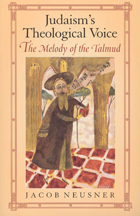
In his attempt to answer these questions, Neusner sets forth the character and the form of the Torah as sung theology. Israel, the holy community, meets God in the synagogue, while at prayer, and in the yeshiva, when studying the Torah—at the moment in each setting when the Torah is received. In both circumstances people do not read but sing out its words. With the written part of the Torah sung in the synagogue, and the oral part declaimed in centers of sacred learning, music provides the medium for Judaism's theological voice.
Neusner identifies a reciprocal exchange between the holy community Israel and God: Israel sings to God when the Torah is studied, and God sings to Israel when the Torah is declaimed. Through the metaphor of music, Neusner offers an account of how he believes those faithful to the Torah meet God in the Torah, and how they should listen to the melody of God's self-revelation. The result is an original theological reflection that will interest all students of Judaism.

The German Romantic theologian and philosopher Schleiermacher wrote, "The virtuosity (or special calling) of a person is at the same time the melody of that person's life, and it remains a simple, meager series of notes unless religion, with its endlessly rich variety, accompanies it with all notes and raises the simple song to a full-voiced, glorious harmony." It is around this melody that Jaroslav Pelikan, a great theologian of our own day, weaves the polyphonic threads of philosophy, theology, morals, history, and personality to create a singular portrait of his life and work.
The Melody of Theology is really two books in one: a dictionary in which a reader can browse through piquant explorations of some of the most interesting topics in Christian theology, and an intellectual autobiography in which Jaroslav Pelikan has used those topics to give an account of the traditions to which he owes the formation of his own mind and spirit. As he says, "An intellectual autobiography in the format of a 'philosophical dictionary' permits the self-indulgence of employing the seeming objectivity of some eighty-two entries, arranged in the impersonal sequence of alphabetical order, to express a completely personal set of prejudices."
Among the large topics addressed in this volume are the Bible, Faith, Grace, Reformation and Renaissance, and Sin. Among the towering figures of religion and theology are Dante, Ralph Waldo Emerson, Erasmus, Gibbon, Martin Luther, Paul the Apostle, and Schleiermacher. Among the technical topics analyzed are Apocatastasis, Christian Creeds, the term "Ecumenical," Eschatology, Patristics, and the Trinity. The Melody of Theology belongs on the bookshelf of anyone who wants to study a history and tradition that precede us and will continue after us, and also of the reader who would like to make the acquaintance of a subtle analytic mind and a generous open heart.

READERS
Browse our collection.
PUBLISHERS
See BiblioVault's publisher services.
STUDENT SERVICES
Files for college accessibility offices.
UChicago Accessibility Resources
home | accessibility | search | about | contact us
BiblioVault ® 2001 - 2024
The University of Chicago Press









